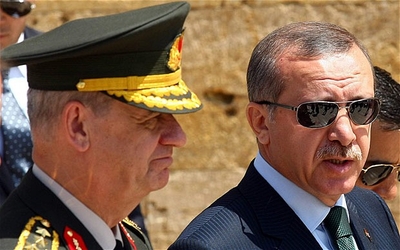Daniel Pipes is one of the prominent conservative names in the United States. He is the founder of the Middle East Forum . … He is also one of the key individuals forwarding idea of the moderate Islam. We had a chance to evaluate recent developments in Turkey by phone with Mr. Pipes as he was in Paris on March 12.

June 2011 elections the turning point
- How do you interpret the conflict between the Gülen movement and the AKP?
Let me start with an historical example: during the Byzantine Empire times, two factions called the Blues and Greens competed against each other in the Istanbul hippodrome to the point that their rivalry became mingled with political and religious issues, sometimes causing riots. The situation now reminds me somewhat of the fighting back then. Islamists were united as long as the mutual enemy was the army. However, the army was removed from politics in July 2011 and since then the Islamists turned inward and fight each other.
What surprised me is that from 2001, the year the AKP was established, until last year, Prime Minister Recep Tayyip Erdoğan showed extraordinary political skills. But since then, he's done nothing but make mistakes. He is deep in Syria, in corruption scandals and he is autocratic and angry. More: each time he takes a misstep he doubles down on it, then triples down on it. However the municipal elections turn out, he has lost much ground, presumably for good.
- How has Erdoğan, who was an Islamist model for 11 years, suddenly became so autocratic, corrupt, and angry?
This fits a general pattern: Islamists are cautious when weak and aggressive when powerful. The Muslim Brotherhood of Egypt under Morsi, for example, went much more rapidly through this same process.
- Do you think both Gülen and the AKP represent moderate Islam?
Neither of them does. Both the AKP and the Gülen movement want to implement Sharia. Both are Islamists and the only differences between them are in personnel and tactics.
Developments in Turkey are important beyond Turkey. Until last year, the AKP served as the model for cautious and successful Islamism but now that Erdoğan has showed his true self, that role has ended. Further, Turkish Islamists fighting each other has weakened the Islamist movement globally.
When the Turkish Armed Forces lost political power
- Why did the Gülen-Erdoğan alliance end?
It began to whither with the expulsion of the armed forces from the political stage after the elections of June 2011, leaving the Islamists alone in power and primed to fight each other.
- Are you referring to the resignation of the chief of the army and commanding officers?
Yes, I am talking about the period that began with their resignations on July 29, 2011.
- What about the Mavi Marmara incident?
That confrontation with Israel in May 2010 marked the first serious sign of the troubles between the Turkish Islamists. Tensions then escalated and turned into open hostilities with the Gezi Park protests of June 2013 and then the corruption revelations of December 2013.
- If hostilities broke out between them only after the 2011 elections, it implies they organized the Balyoz and Ergenekon operations together.
Yes, tensions between the AKP and the Gülen movement existed before June 2011. However, they needed each other to confront the armed forces and worked together effectively.
AKP now allied with the army
- What do you think about the Dec. 17 releases about AKP corruption and the timing of these revelations?
It was an extraordinary development, and even more so the tapes released two weeks ago of the prime minister's private conversations with his son Bilal.
- It is said that conflict between Erdoğan and the Gülen movement creates opportunities for the army.
Indeed, it does. That the Islamists openly fight against each other has prompted Erdoğan to invite the armed forces to his side. It accepted, so the AKP is working with them against Gülen.
- Those who Erdoğan jailed are now being released. Does that mean the army has returned to the political stage?
Yes, to an extent, it is back. It is more powerful politically than six months ago.
- Are those, who were imprisoned, also taking the stage?
Yes, especially İlker Başbuğ the former chief of the general staff.
 İlker Başbuğ when chief of the general staff, with Prime Minister Erdoğan. |
- In your opinion, is this, an attempt by the AKP to establish an alliance with the army against the Gülen movement.
Yes, and Erdoğan may eventually regret this move, as the military leadership owes him no loyalty.
Alternatives to Erdoğan
- Is there anyone other than Erdoğan within the AKP?
Perhaps. The obvious tension between President Abdullah Gül and Erdoğan comes right to mind. However, Gül signed both the Internet and the Supreme Board of Judges and Prosecutors (HSYK) laws, showing that he, in the final analysis, is with Erdoğan, not against him.
- So, this shows Gül has problems with Fethullah Gülen.
Yes, he does.
- But Abdullah Gül was working with the Gülen movement until recently.
Yes, he was. These are complex power politics.
 Fethullah Gülen (l) and Abdullah Gül represent two forms of cautious Islamism. |
Erdoğan and Washington
- Do you think the alliance between Erdoğan and Washington has come to an end?
No, but it is much weaker than it used to be. For the first time, the U.S. administration sees the Turkish prime minister not as a solution but as an obstacle.
- Well then, what is the U.S. solution? Who can the U.S. administration collaborate with in Turkey?
Frankly, the Obama administration does not have a clear ally right now in Turkey. The CHP and MHP are not friendly, while the BDP is not internationally oriented. The armed forces are not an independent political actor. That leaves other AKP leaders who remain under Erdoğan's control.
- So, Washington has no alternative to Erdoğan right now.
Correct.
